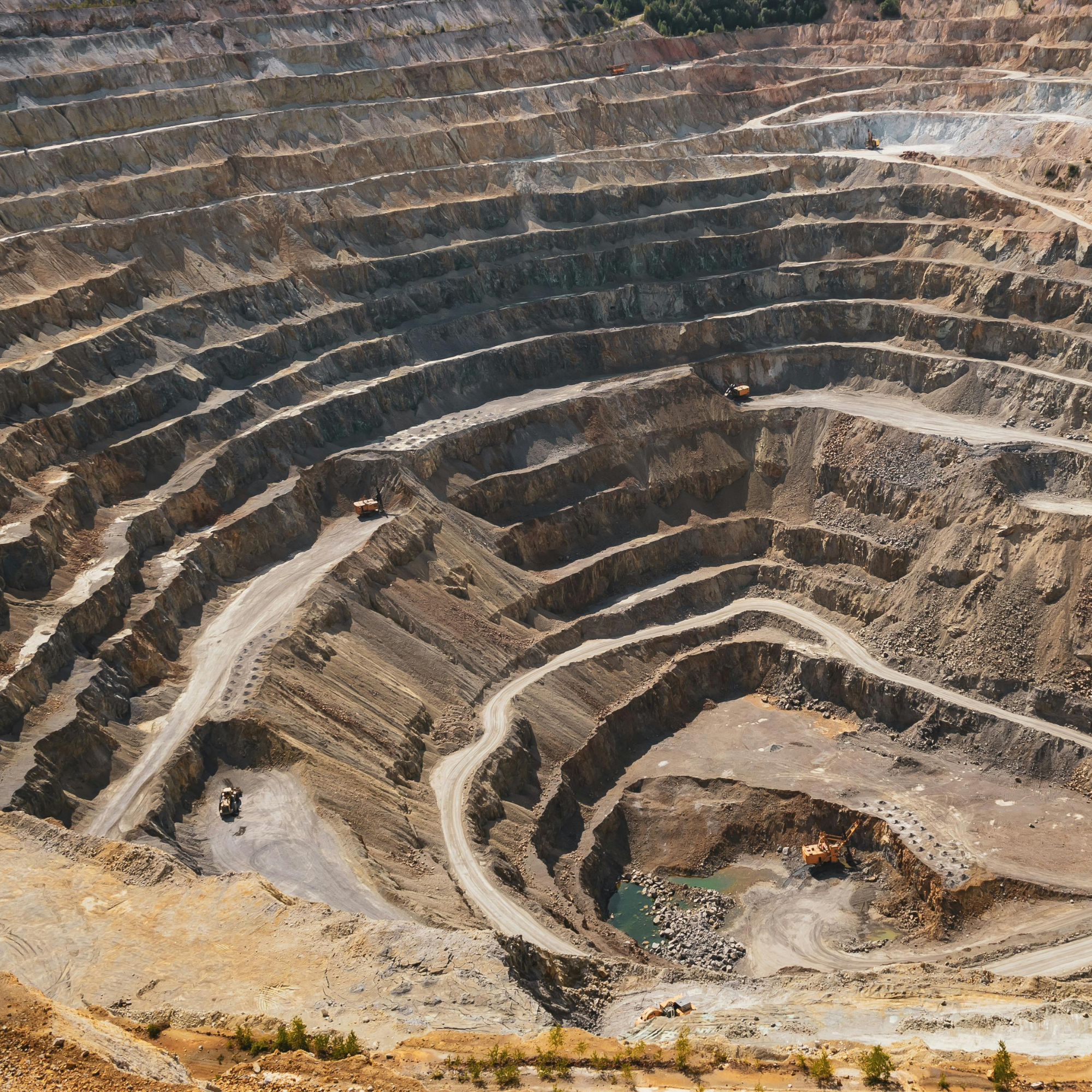Policy & Issues
CMA champions policies that balance environmental stewardship, national security, and economic growth, ensuring Colorado’s mining industry remains a trusted, forward-looking voice in regulatory, legislative, and strategic land use decisions.
CMA Policy PositionsWater
Colorado has among the most stringent water quality standards in the nation and Colorado’s mine operators work closely with state and federal regulators to help ensure that mining operations in our state meet or exceed the requirements of the Clean Water Act and State statutes and regulations governing potential impacts to water. CMA maintains a positive working relationship with Colorado’s Department of Public Health and Environment (CDPHE) and regularly works with the Water Quality Control Division (WQCD) to ensure that mining interests are well represented in water-related rulemakings.
-
Colorado is also home to the first state Dredge and Fill program. Established by HB24-1379 following the November 2023 U.S. Supreme Court decision in Sackett v. EPA 598 U.S. 651 (2023) which narrowed the scope of Waters of the United States “WOTUS” subject to federal regulation for dredge and fill activities under the Clean Water Act, HB24-1379 establishes a framework to regulate dredge and fill activities for “gap waters” no longer covered by the U.S. Army Corps of Engineer’s (Corps.) Clean Water Act Section 404 program.
CMA played a central role in negotiating the legislation that was adopted, and we continue to work with the Colorado Department of Public Health and Environment (CDPHE) to establish implementing regulations that will safeguard water resources while providing a workable permitting framework that will allow for the continued success of sustainable mining operations in Colorado. CMA believes that the implementing regulations for the program should closely follow the intent of the legislation that was carefully negotiated, including the incorporation of nationwide and regional permits of the Corps., appropriate use of exemptions, and a feasible framework for compensatory mitigation.
CMA also supports efficient processing of point source discharge permits to ensure that permits are timely issued and do not cause unnecessary delays in project approval or renewal. Our Water Quality Committee regularly engages with CDPHE to improve the permit review process and reduce backlogs. Addressing water quality permitting challenges in Colorado is a top priority to allow existing operations to succeed and to attract new mining investment to our state.
Air
CMA Policy PositionsCMA’s members and mineral products end users are subject to a range of air related regulations at the local, state, and federal levels, and we work diligently to comply with all applicable requirements. Air regulation has seen significant activity in recent years in Colorado, with 29 pieces of air focused legislation introduced in the past 7 years. Regulations implementing much of this legislation are still under development. CMA participated in lengthy stakeholder engagement processes developing many of the recent air quality requirements and we will continue to actively participate as regulations are developed.
-
Despite this, air regulations in Colorado have been repeatedly cited as an impediment to new investment in our state and significantly impact the regulated community, including mining operations across a range of commodities produced in Colorado. As such, CMA opposes the introduction of new air legislation or the promulgation of new air quality rules. Both regulators and industry should allow time for existing regulations to work and for industry to adapt to recently imposed requirements without the added pressure of complying with new or additional requirements which often conflict with and undermine existing frameworks.
CMA Policy PositionsEnergy
Mining is the front end of the supply chain for every energy source in the nation. Colorado’s diverse mineral endowment forms the backbone of conventional and carbon-free energy production with high quality coal reserves for both domestic and foreign markets and significant uranium reserves to fuel carbon free nuclear energy. Colorado also leads the nation in molybdenum production, has significant gold, vanadium, copper, silver and other critical minerals and rare earth resources used in wind, solar, oil, gas, and geothermal infrastructure.
-
CMA believes that Colorado and the nation benefit from an all-of-the above energy approach that will be needed to meet rapidly growing demand for affordable and reliable energy. Colorado’s high energy content coal continues to provide a third of the power supply in our state while providing high paying jobs in rural communities. As Colorado continues to transition its energy portfolio, our rich mineral endowment offers the vital resources necessary to provide carbon-free energy, including some of the richest uranium reserves in the country for nuclear power, as well as molybdenum, vanadium, copper, silver, and critical minerals and rare earth elements for wind, solar, battery storage, and power transmission.
CMA Policy PositionsLand Use
Public policy decisions for the management of lands at the federal, state, and local levels have profound impacts on the mining industry and our competitiveness in the global economy. CMA strongly supports prudent use of our public lands and the multiple use land management framework that governs U.S. Bureau of Land Management lands and U.S. Forest Service Lands. Multiple use management has allowed our public lands to provide the greatest good for the greatest number since this balanced approach was developed. Within this framework, mining must continue to play a central role as the principal land use that it is under the Federal Lands Management and Policy Act (FLPMA), which was enacted nearly 50 years ago.
-
Unfortunately, land management policies largely driven through the resource management planning process have eroded the original intent of multiple use management in recent years and have increasingly led to restricted access to valuable minerals or the outright withdrawal of these vital resources altogether. The short-sighted restriction of access to minerals makes us less competitive and ignores the success of conservation, recreation, and other land uses designed to protect our most vulnerable environmental resources taking place in conjunction with exploration and production operations. CMA and its members have worked with land managers at the federal, state, and local levels to responsibly develop mineral resources since the inception of these management structures and we will continue to do so.
While balanced management of our federal public lands is vital, our state and local governments play an equally important role in ensuring access to the minerals we need for energy, technology, and national security. Coloradans stand to benefit from the responsible development of minerals in our state- which has the highest environmental standards in the world- rather than driving mining investment away to jurisdictions with little to no environmental standards and poor humanitarian conditions. CMA supports state and local land use policies that encourage sustainable mining operations which in turn allows Colorado to thrive.
Additionally, Colorado has a backlog of legacy mine sites from the pre-law era before modern mining practices and environmental standards. These unreclaimed locations include abandoned uranium mine (AUM) sites with the potential to impact nearby communities. CMA supports innovative efforts to remediate these legacy sites in a manner that protects public health and the environment while recovering valuable resources like uranium and critical minerals. Recycling these materials from waste not only advances environmental remediation but also strengthens domestic supply chains vital to national security and energy independence.
Critical Minerals and Rare Earth Elements
CMA Policy PositionsColorado has one of the most diverse mineral endowments of any state in the nation and is uniquely positioned to contribute to U.S. development of critical minerals and rare earth elements with a wide range of rare earth elements and minerals classified as critical by the U.S. Geological Survey, the Department of Energy, and others. Colorado has reserves of vanadium, gallium, scandium, tellurium, tungsten, and titanium, light and heavy rare earth elements, as well as copper and uranium. Colorado coal reserves provide additional potential for rare earth element development.
-
In recent years, geopolitical stresses have increasingly restricted access to critical minerals and rare earth elements needed for advanced technology and national security applications.
China is the primary producer of mineral commodities listed as essential to U.S. economic and national security, controlling 80-90% of global rare earth element production, 90% of global mineral processing capabilities, as well as the market prices for rare earth elements at each step of the process. China refines the majority of minerals needed for electric vehicle batteries and energy technologies and routinely restricts access to critical minerals to manipulate markets.
As geopolitical factors continue to strain previously relied upon supply sources, the U.S. must increase investment in developing these valuable resources domestically.
CMA strongly supports the exploration and development of critical minerals and rare earth elements in our state. Critical minerals and rare earth elements are currently being developed in jurisdictions with few if any environmental standards and often employ humanitarian conditions unimaginable in the developed world. If Colorado continues to grow and expand its advanced technology and clean energy sectors, it should do so with the use of responsibly sourced domestic minerals rather than continued reliance of unreliable and unsustainable mineral sources. Bringing these vital projects online will require the alignment of federal, state, and local regulatory frameworks so that Colorado can attract investment levels consistent with our world class geologic potential.
Advanced Technology and National Security
CMA Policy PositionsColorado’s broader economy is highly dependent on mined minerals. Colorado is a national hub for advanced technology, national defense systems development, aerospace, and new energy technologies. With a significant national defense presence and the largest aerospace employment base of any state in the country, Colorado’s leading industries all depend on reliable mineral supply chains.
-
In recent years, mineral supply chains have become among the most significant bottlenecks to our state and Nation’s most pressing national defense, technology, and energy security challenges. As geopolitical stresses increasingly restrict access to the minerals central to advanced technology, Colorado’s mining industry provides secure supply sources to ensure our national defense and energy security needs are met.
Colorado is the leading producer of molybdenum in the nation- a mineral vital for making high strength steel alloys frequently used in national defense, aerospace, and infrastructure applications. Colorado also has rich reserves of vanadium used in alloys. Gold mined in Colorado is used in a range of aerospace and microchip products. Colorado’s copper reserves can help meet the rapidly growing need for electric transmission infrastructure, battery storage, and other uses. And Colorado’s additional critical minerals and rare earth elements, including gallium, scandium, tellurium, tungsten, and titanium offer the opportunity to contribute to Colorado’s advanced technology, aerospace, national defense, and clean energy industries.

Committed to Community
Community InvolvementCMA champions sustainable mining and workforce development through award-winning safety programs, environmental leadership, and education partnerships. Learn more about our Sustainability, Safety and Education efforts.






